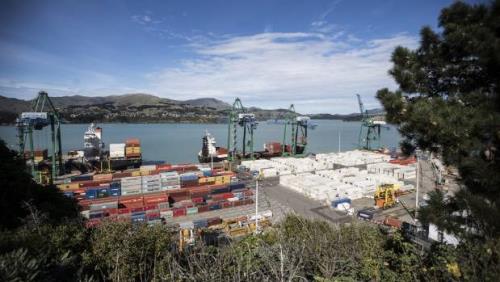Strike action takes toll on all involved
28 March 2018

Lyttelton Port was shut down much of last week due to 200 workers striking.
New Zealand is a trading nation and our ports are a critical link in the movement of our primary produce overseas and our imports. Port workers have always had a powerful position in the economy.
There have been famous strikes over the years, the most recent being the Waterfront Dispute of 1951. That started with a technical strike followed by a lock-out with the dispute carrying on for 151 days. Eventually the workers were defeated and a new workforce was installed in New Zealand's ports.
Older readers will have noticed the changing nature of the waterfront in Wellington, as in other cities. When I was young the port was full of coastal traders and smaller international vessels and wharves in Eastbourne, Petone, Thorndon, and Clyde Quay were busy most days.
Mechanisation has put an end to that and containerisation has revolutionised water transport.
We now have a much smaller number of port workers, many highly skilled and operating heavy equipment that supports container shipping.
The ports have been relatively quiet for some time but Lyttelton may be heralding a more militant workforce.
In 1894 we had our first Industrial Conciliation and Arbitration Act which was seen as revolutionary in its day. Where workers and employers couldn't agree on a new collective agreement, a third party such as a judge would hear the arguments and decide what was appropriate. Strikes were not allowed.
Today we don't have that system and it's more the law of the jungle. Workers can go on strike for a new collective agreement and employers can lock them out to hammer down their expectations.
The Lyttelton Port dispute has the problem of most industrial disputes with two competing parties hitting the media with their angle. Lyttelton Port has two key unions, namely the Rail Maritime and Transport Union (the Rail Union) and the Maritime Unions of New Zealand (the Maritime Union). The Rail Union has a collective agreement that expires in September and is the Union on strike.
The nub of the dispute appears to be that the Rail Union wants the same rate of pay as the other union but does not want to agree to the flexible rostering the other union accepted and that the employer says goes with it.
The Lyttelton Port Company has offered the Rail Union workers an at least 3 per cent salary increase for three years, while the rate of inflation is currently only 1.6 per cent. This is without them accepting the flexible rostering arrangements. They would get the same as the Maritime Union if they accepted those arrangements.
This might seem reasonable. If the Rail Union can get the higher pay rate without its workers accepting flexible rostering it will have done very well. The Rail Union says the flexible rostering might mean workers operate heavy machinery in all weather for up to 16 hours and that this compromises safety. They say this could lead to fatigue and could pose a health and safety risk for workers.
Presumably the Maritime Union doesn't hold that view as its workers have been on the flexible rostering for a year.
Given the key role of a port in the New Zealand economy, the costs of the strike are huge. We are told more than half the South Island's containers and 70 per cent of its imports go through Lyttelton Port. Canterbury manufacturers say they are frustrated the strike is causing delays in receiving crucial materials and in pushing freight costs up because of the need to transport goods to and from other distant ports.
Obviously there is a significant overhead if you have to transport something from Port Chalmers or the Bluff through to Christchurch as opposed to getting it from Lyttelton. Lyttelton is the country's largest port for shipping coal and handles a significant quantity of agricultural exports, including 44 per cent of wool exports.
The chief executive of the Christchurch-based Manufacturers' Network says the closure of the port for any amount of time will have significant impact on local business and the wider Canterbury economy. Obviously striking also has a significant impact on the striking workers and their families because they are getting no pay.
Even with some financial support from other unions or their own resources, there is likely to be real hardship involved.
Under the Employment Relations Act ports are "essential services" and accordingly unions must give a minimum of 14 days' notice of strike and say who will go on strike and for how long. For standard "non-essential" workers, a union can simply provide a strike notice to the employer, and then immediately direct its members to walk off the job.
The Act also provides a process for dealing with negotiations that remain deadlocked. It is known as facilitated bargaining and can ultimately result in the Employment Relations Authority making a recommendation to the parties on how to resolve their differences.
Where there have been serious and sustained breaches of good faith the authority can even resolve a dispute by setting the terms of the collective agreement.
As with many industrial disputes, this one has become bitter with the personalising of the dispute. Chief executive Peter Davie has been enjoying a skiing holiday in central Europe in recent days which has further inflamed the dispute and caused criticism of him. One thing for sure, the longer the dispute remains unresolved the more embittered it is likely to become.
Should workers and employers be left to slug it out until one gives in through economic exhaustion? Alternatively, should we go back to the old days of a third party deciding things for those who can't resolve their differences themselves? Maybe the parties can find a resolution themselves.


